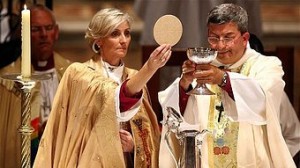 You may have heard by now that The Church of England recently voted down a measure that would have allowed women priests to become bishops. {~audible sigh~}
You may have heard by now that The Church of England recently voted down a measure that would have allowed women priests to become bishops. {~audible sigh~}
Sarah Coakley points out in her article on the whole matter that the two bodies of church leadership, the houses of bishops and clergy, overwhelmingly voted in support of this measure, but the house of laity that is the third part of the General Synod effectively defeated this measure with its very narrow vote. This raises a lot of interesting questions about how decisions are made in this (and other) church bodies, and how well leadership reflects membership.
Coakley goes on:
But are even these political and governmental factors – historic and important as they are – the most significant feature of the current furore? I think not. The most dangerous element in this long-running saga has been insidiously hidden under an almost farcical set of pragmatic and political attempts at compromise, attempts to “protect” conservatives from the visceral dread of female authority. In short, the real issues are theological, and it is the Church’s current theological amnesia and confusion which is preventing it from thinking straight, let alone extending its honourable and distinctive traditions of ecclesiology to meet this new challenge.
Ironically, it is the most eminently theological of recent Archbishops, Rowan Williams, who has failed even to assemble a Doctrine Commission to consider this question. Indeed, ostensibly on financial grounds, the Doctrine Commission was allowed to lapse altogether under his arch-episcopacy until very recently, when it was reconstituted in a form far too cumbersome and unwieldy to apply incisive theological direction.
In our supposedly “secular” culture, the Church of England seems to have succumbed to the idea that theological ideas do not matter very much, and this may bespeak a deeper malaise even than the current crisis itself. Young people are turning back to the Church, longing for spiritual and intellectual bread; by and large stones await them, even despite a most promising new generation of young priest-scholars (women and men) who are beginning to rise through the ecclesial ranks. Perhaps in a generation things will be different.
But for the moment the Church has in effect signed its own theological death warrant. At the end of this summer, amid a new storm of fury about a confused conservative amendment to the Measure (astonishingly backed by both Archbishops to placate the defectors), I was invited to address the House of Bishops on “the theology of women bishops.” I made the following three points, and stand by them:
- we cannot compromise on the historic theology of the bishop as locus of unity;
- we must return afresh to our distinctively Anglican notions of reason and tradition to solve this crisis, not lapse into rational incoherence; and
- we must resist in the Church the supervenience of bureaucratic thinking (with all its busy political pragmatism) over theological and spiritual seriousness.
Coakley explores each of these points further in her piece. It’s worth your time to head over and read more.
Pic via.












